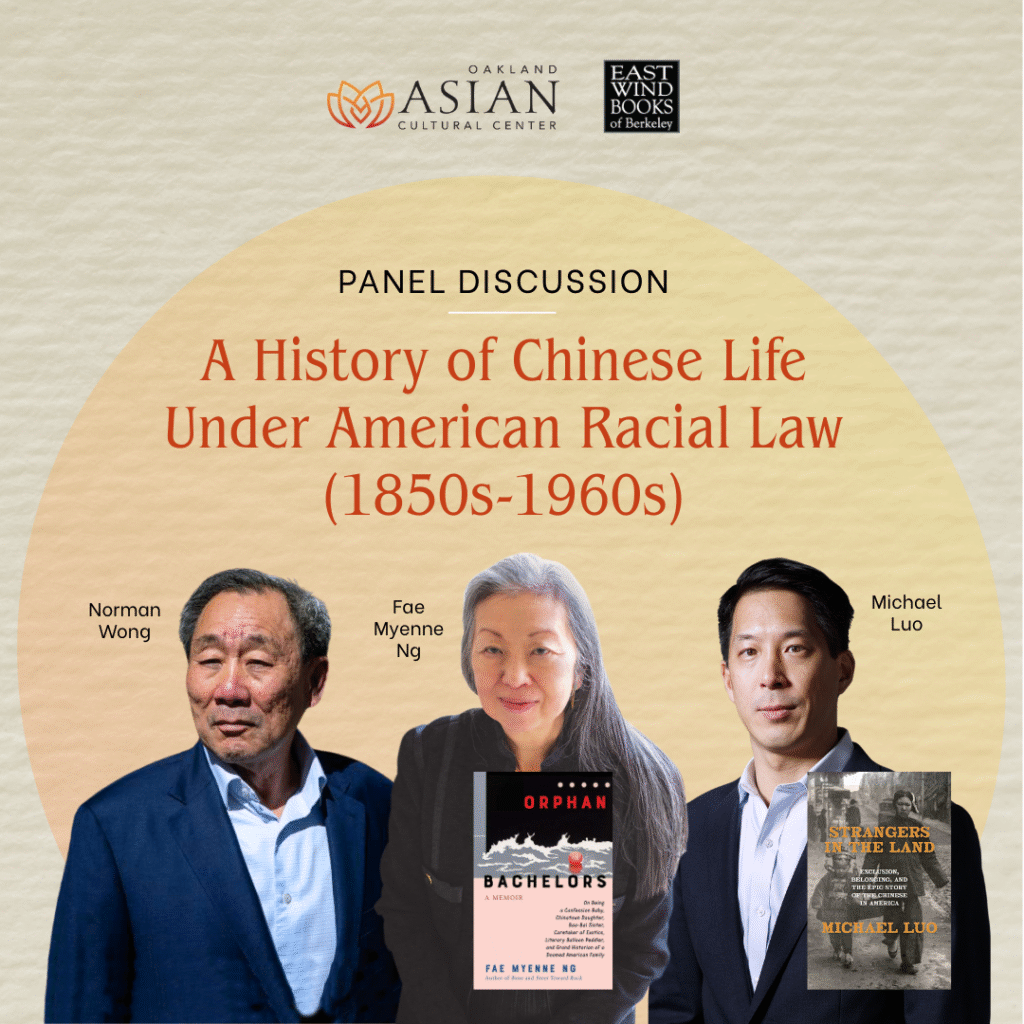Panel Discussion: A History of Chinese Life Under American Racial Law (1850s-1960s)


Saturday, September 20
2-4 pm
FREE
Join us for life stories of Chinese and Chinese Americans who endured racial violence and discrimination as second-class citizens during the 1850s to 1960s. Ground-breaking authors Michael Luo* and Fae Myenne Ng*, and Wong Kim Ark’s great-grandson Norman Wong, share the stories of Chinese lives under American racial laws enacted to exclude, deport, and deny their due process of law.
From the 1882 Chinese Exclusion Act to the 1956 Immigration and Naturalization Service’s (INS) Chinese Confession program, the U.S. government scrutinized and separated families and communities, conducted raids in Chinese communities, and hunted for “illegal” paper sons. These stories echo the recent raids and terror enforced today against immigrants from Asia, Africa, and Latin America.
In Strangers in the Land, Michael Luo illuminates the stories of racial violence and resistance of Chinese immigrants in the 19th century. Luo writes of early victims of anti-Asian violence, like Gene Tong, a Los Angeles herbalist who was dragged from his apartment and hanged by a mob during one of the worst mass lynchings in the country’s history, and of demagogues like Denis Kearney, a sandlot orator who became the face of the anti-Chinese movement in the late-1870s.
Fae Myenne Ng’s Orphan Bachelors is a memoir of San Francisco’s Chinatown and of a family building a life in a country bent on their exclusion. She writes, “exclusion and confession WERE, the two slamming doors of America … All his life, my father raged that the Exclusion Act was a brilliant piece of legislation because it was bloodless. He’d intone, ‘America didn’t have to kill any Chinese; her law assured none would be born.’”’
Norman Wong is the great-grandson of Wong Kim Ark. Wong Kim Ark fought a landmark Supreme Court case to claim his right as an American citizen. Writes The Washington Post: “In 1895, Wong Kim Ark returned from a visit to his family’s ancestral village in Taishan, in China’s Guangdong province, and was barred from reentering the United States. His three-year legal battle culminated in the Supreme Court’s ruling that the citizenship clause of the 14th Amendment — which protects those born on U.S. soil who are “subject to the jurisdiction” of the government — affirmed his status as an American by birth.”
This event is sponsored by Eastwind Books, Oakland Asian Cultural Center, Asian American Research Center (UC Berkeley), Center for Race & Gender (UCB), Organization of Chinese Americans (OCA) East Bay, Asian American & Asian Diaspora Studies (UCB), Cal Alumni Association, Chinese Chapter (UCB); Center for Race, Immigration, Citizenship & Equality, (UC Law SF), History Department (UCB).
* Please note that Michael Luo and Fae Myenne Ng will join the panel virtually online.
Panelist Bios
Michael Luo is an executive editor at The New Yorker and writes regularly for the magazine on politics, religion, and Asian American issues. He joined The New Yorker in 2016. Before that, he spent thirteen years at the New York Times, as a metro reporter, national correspondent, and investigative reporter and editor. He is a recipient of a George Polk Award and a Livingston Award for Young Journalists. He is the author of Strangers in the Land: Exclusion, Belonging, and the Epic Story of the Chinese in America.
Fae Myenne Ng is the author of Orphan Bachelors, a Memoir, the bestseller and PEN/Faulkner Fiction finalist Bone, and the American Book Award winner Steer Toward Rock. She has been the recipient of fellowships from the American Academy of Arts & Letters, the Guggenheim, the Lannan Foundation, the NEA, the Radcliffe Institute, and the Rockefeller Foundation. She teaches creative writing and literature in UC Berkeley’s Department of Asian American and Asian Diaspora Studies.
Norman Wong is the great-grandson of Wong Kim Ark, who fought a landmark Supreme Court case to claim his right as an American citizen in 1895, thereby affirming the 14th Amendment’s establishment of birthright citizenship for all born in the United States. Norman lives in the Bay Area, with his wife, Maureen and children.
